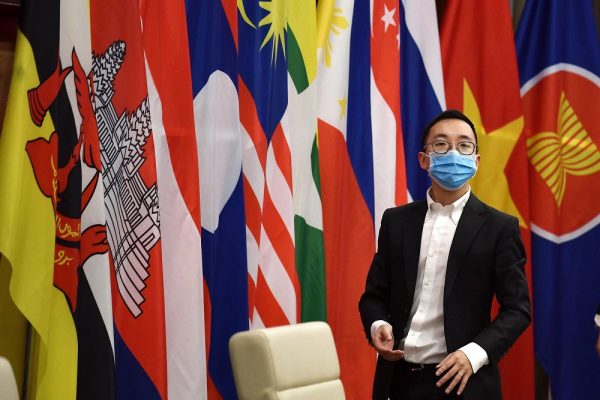Relatively little data has been obtained from Cambodia, Laos, and Myanmar. But while much has been made of divergent national responses, ASEAN’s collective action in response to the pandemic has been underappreciated.
ASEAN’s experience with previous pandemics such as SARS and avian and swine influenzas has led member states and their citizens to take COVID-19 seriously. The ASEAN Secretariat Health Division alerted ASEAN senior health officials to the novel coronavirus on 3 January 2020, four days after China’s notification to the World Health Organization.
By mid-February, the ASEAN ministerial health, foreign affairs and tourism bodies had intensified multi-sectoral cooperation, particularly through the ASEAN+3 platform (ASEAN, China, Japan and South Korea). ASEAN also activated pandemic preparedness protocols (previously formed with the support of ASEAN dialogue partners) for travel, tourism and borders, sharing of information and best practices, and strengthening response capabilities.
As national borders closed, ASEAN’s Guidelines on the Provision of Emergency Assistance enabled mutual assistance in repatriating citizens to their home countries.
Other ASEAN public health and emergency response agencies have also been quick to act. The US-supported ASEAN Project on Pandemic Preparedness and Response ensures every member has an individually-calibrated baseline pandemic response protocol. And the Canadian-supported ASEAN Emergency Operations Centre Network continues to give situational updates while the ASEAN Bio-Diaspora Regional Virtual Centre publishes analyses of disease spread. Such data is vital to ASEAN states’ governance policies on movement controls and economic activities.
The emphasis on sharing information and best practices at every ASEAN COVID-19 meeting is producing valuable exchanges and enabling national agencies to act against virus importation and disinformation, and select appropriate treatment protocols.
Yet ASEAN members acknowledge policy and resource limitations. Much more must be done to counter COVID-19. The Special Summit on COVID-19 in mid-April saw ASEAN leaders propose reallocating available funds towards battling the pandemic and establishing a COVID-19 ASEAN Response Fund, discussing management protocols of potential vaccines and instituting standardised operations protocol for epidemics. These themes were reiterated at the Special ASEAN+3 summit on COVID-19. Dialogue partners — especially China, the United States and the European Union — were also encouraged to continue supporting ASEAN.
ASEAN’s reliance on external trade and foreign investment means its members are mindful of their vulnerabilities amid the current socioeconomic disruptions arising from COVID-19 and polarity between the United States and China. ASEAN presented a comparatively stable sociopolitical and economic regional situation in the initial months of the pandemic. Beyond rice restriction hiccups, ASEAN ministries of agriculture and trade ensured adequate food supplies through the ASEAN Food Security Information System and ASEAN+3 Emergency Rice Reserve. Individual members have also provided national relief to businesses and workers.
Still, member states are working hard to overcome the serious challenges ahead. The Economic Ministers Meeting on COVID-19 emphasised the need to reduce non-tariff barriers and accelerate the use of the ASEAN Single Window to secure supply chains. Aware that COVID-19 has exposed structural inequities, the ministers stressed that micro, small and medium enterprises must be actively supported in their assimilation into e-commerce to promote overall equitable economic development.
As tourism is a key economic driver in ASEAN countries, the sector has been given technical and financial support to facilitate post-pandemic recovery. More recently, the economic ministers adopted the Hanoi Plan of Action on Strengthening ASEAN Economic Cooperation and Supply Chain Connectivity in Response to the COVID-19 Pandemic. They are seeking to protect the free flow of essential goods — particularly medical and food supplies — and to keep critical infrastructure and trading routes open, guarding against future shocks. Tourism, digital commerce, trade and investment, and countering economic crises were reiterated at the 36th ASEAN Summit in June.
The ASEAN Coordinating Council Working Group on Public Health Emergencies is responsible for ensuring these ambitious plans are effective. Its tasks include the actual utilisation of the newly-formed COVID-19 ASEAN Response Fund, establishing the ASEAN Regional Reserve of Medical Supplies for Public Health Emergencies and formulating the ASEAN Standard Operating Procedures for Public Health Emergencies. Vietnam has pledged to see the proposals for the latter two initiatives through by obtaining the ASEAN leaders’ approval.
While these efforts only partly mitigate the grave impact of COVID-19, they show that ASEAN members are stepping up to cooperate substantively during a crisis. The ASEAN Coordinating Council, tasked with overseeing the regional efforts to counter COVID-19, must ensure the programs and funds are used effectively and that there is steady implementation. By the year-end Summit, there should be some accountability to the member states and ASEAN public in the sharing of robust data — if not some experience of the mitigating effects.
Hsien-Li Tan is Assistant Professor and Co-Director (Teaching) for the ASEAN Law and Policy Programme at the Centre for International Law (CIL), National University of Singapore. She is also editor for the Asian Journal of International Law.
This article is part of an EAF special feature series on the novel coronavirus crisis and its impact.

